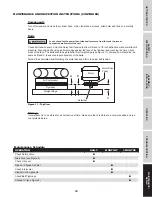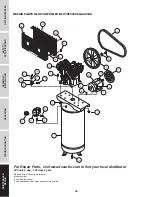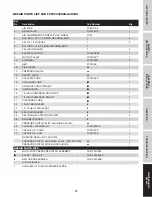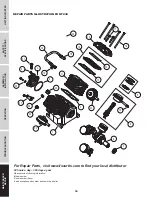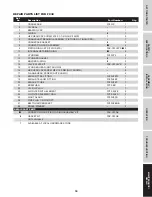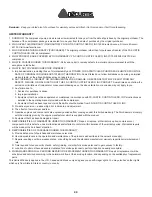
MAINTENANCE
/
REP
AIR
TROUBLESHOOTING
OPERA
TION
SAFETY
/
SPECIFICA
TIONS
GETTING ST
ARTED
7
ASSEMBL
Y
/
INST
ALLA
TION
INSTALLATION INSTRUCTIONS
Disconnect, tag and lock out power source then release all pressure from the system before
attempting to install, service, relocate or perform any maintenance.
Do not lift or move unit without appropriately rated equipment. Be sure the unit is
securely attached to lifting device used. Do not lift unit by holding onto tubes or coolers. Do
not use unit to lift other attached equipment.
Never use the wood shipping skids for mounting the
compressor.
Picking the Location
Install and operate unit at least 18 inches from any obstructions in a
clean, well ventilated area. The surrounding air temperature should
not exceed 100° F. This will ensure an unobstructed flow of air to
cool compressor and allow adequate space for maintenance.
Do not locate the compressor air inlet
near steam, paint spray, sandblast areas or any
other source of contamination.
NOTE:
If compressor operates in a hot, moist environment, supply
compressor pump with clean, dry outside air. Supply air should be
piped in from external sources.
Tank Mounting
The tank should be bolted into a flat, even, concrete floor or on a
separate concrete foundation. Vibration isolators should be used
between the tank leg and the floor. Part number FVF134A isolator
pads are recommended for units.
When using isolator pads,
do not draw bolts tight.
Allow the pads
to absorb vibrations. When isolators are used, a flexible hose or
coupling should be installed between the tank and service piping.
Failure to properly install the
tank can lead to cracks
at the welded joints and possible bursting.
Piping
Never use plastic (PVC) pipe for
compressed air. Serious injury or death could
result.
Any tube, pipe or hose connected to the unit must be able to
withstand the temperature generated and retain the pressure. All
pressurized components of the air system must have a pressure rating of 200 psi or higher. Incorrect selection
and installation of any tube, pipe or hose could result in bursting and injury. Connect piping system to tank using
the same size fitting as the discharge port.
Minimum Pipe Size For Compressed Air Line
CFM
LENGTH OF PIPING SYSTEM
25 FEET
50 FEET
100 FEET
250 FEET
10
1/2 inch
1/2 inch
3/4 inch
3/4 inch
20
3/4 inch
3/4 inch
3/4 inch
1 inch
40
3/4 inch
1 inch
1 inch
1 inch
60
3/4 inch
1 inch
1 inch
1 inch
100
1 inch
1 inch
1 inch
1-1/4 inch
Figure 3 - Isolator Pad
≥ 18
inches
≥ 18
inches
≥ 18
inches
Figure 2 - Location

















